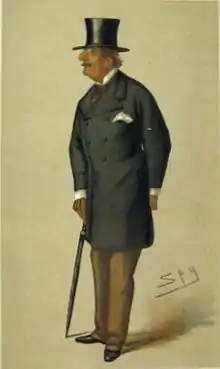Alfred Horsford
General Sir Alfred Hastings Horsford GCB (1818 – 13 September 1885) was a senior British Army officer who went on to be Military Secretary.
Sir Alfred Horsford | |
|---|---|
 | |
| Born | 1818 Bath, Somerset |
| Died | 13 September 1885 Munlochy, Scotland |
| Allegiance | |
| Service/ | |
| Years of service | 1833–1880 |
| Rank | General |
| Commands held | South-Eastern District |
| Battles/wars | Xhosa Wars Crimean War |
| Awards | Knight Grand Cross of the Order of the Bath |

Military career
Born in Bath and educated at the Royal Military College, Sandhurst, Horsford was commissioned into the Rifle Brigade in 1833.[1]
He served in the Cape Frontier War in 1847 and was Commanding Officer of 1st Bn the Rifle Brigade during the 8th Xhosa War in 1852.[1]
He also served in the Crimean War and fought at the Battle of Alma, Battle of Inkerman, Battle of Balaklava and the early part of the Siege of Sevastopol.[1]
He served in the repression of the Indian Mutiny, having been made Commander of the 6th Brigade at the Capture of Lucknow.[2]
He was made Deputy Adjutant-General at Army Headquarters in 1860, a Brigade commander at Aldershot in 1866, Major-General on the General Staff at Malta in 1869 and General Officer Commanding South-Eastern District in January 1872.[3] He went on to be Military Secretary in 1874.[1]
In retirement he was involved in an accident when Frederick Gye, Manager of the Royal Italian Opera, was assisting Horsford over a fence. Horsford's gun went off and shot Gye in the eye.[4]
References
- Sir Alfred Horsford at Oxford Dictionary of National Biography
- Historical Records of the Queen's Own Cameron Highlanders, Page 132
- "Army Commands" (PDF). Archived from the original (PDF) on 4 March 2016. Retrieved 2 July 2016.
- General News Bruce Herald, 1879
| Military offices | ||
|---|---|---|
| Preceded by Sir David Russell |
GOC South-Eastern District 1872–1874 |
Succeeded by William Parke |
| Preceded by Caledon Egerton |
Military Secretary 1874–1880 |
Succeeded by Sir Edmund Whitmore |
| Preceded by Sir Charles Yorke |
Colonel-Commandant of the 2nd Battalion, The Prince Consort's Own (Rifle Brigade) 1880–1885 |
Succeeded by Sir William Norcott |
| Preceded by James Webber Smith |
Colonel of The 14th (Buckinghamshire) Prince of Wales's Own Regiment 1879–1880 |
Succeeded by Alfred Thomas Heyland |
| Preceded by Henry Cooper |
Colonel of the 79th Regiment of Foot (Cameron Highlanders) 1876–1879 |
Succeeded by John Douglas |